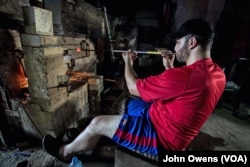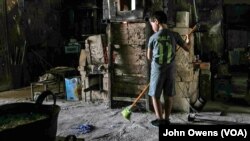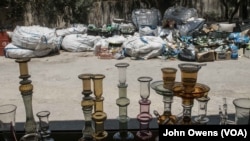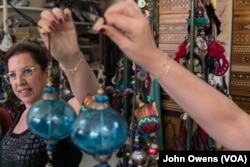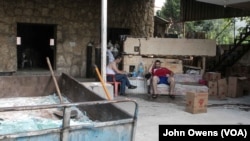Face lit up orange by the darting flames of the furnace, Mahmoud Khalifeh manipulates the blowpipe with ease, using skills that stretch back not just generations, but millennia.
Much like his father, and his father’s father before that, Muhammed has mastered glass blowing, an art developed in the region more than 2,000 years ago.
But despite a profitable pairing with an eco-entrepreneur and an unexpected boost from Lebanon’s trash crisis, fears remain the craft could be lost to a modern age of mass production.
A hidden gem
The Khalifehs say they are the only glass blowers in Lebanon, and one of a few across the region keeping the tradition alive - it is feared the Syrian war has dwindled numbers further.
“We are one family — we are brothers, sons, cousins” explained Mahmoud’s sister Nisrine Khalifeh, who decorates the finished products.
“We inherited it from generation to generation. It is difficult, and it is dangerous too, to work at 1400 degrees centigrade”, she said referring to the intense heat the furnace must generate to melt glass.
Approaching the family’s small workshop, there is not much to give away how unique their efforts are.
They labor amid sweltering conditions in a run-down building located on a discreet alley in the southern coastal town of Sarafand, making everything from vases and jugs to baubles and an array of other objects.
But though fairly innocuous now, on this site once stood Sarepta, an ancient fortified city of the Phoenician empire, which spanned Syria, Lebanon and northern Israel.
It was this seafaring civilization that spawned the art of glassblowing in around 50BC, enabling cheaper production and allowing artisans to create new shapes and designs.
“People from abroad were enchanted by this technique, and the transparency of the glass, and spread it across the world,” explained archaeologist Nada Kallas.
Moving with the times
But with factories now able to produce in larger quantities and at lower costs using modern machinery, in recent years the Khalifes have had to adapt.
Producing the crafted vases and ornaments the family is known for is not cheap. The cost of getting the furnace to the right temperature means that, when ablaze, it must run 24 hours a day until an order is completed.
Though a hive of activity when work is ongoing, with six or seven members of the family lending a hand, it can lie dormant for months between jobs.
The business was near bust when Ziad Abichaker, a well known eco-entrepreneur and owner of waste management company Cedar Environmental, came to the family with what he saw as a win-win proposal.
With Lebanon’s only glass manufacturing and recycling plant destroyed in the war with Israel in 2006, Abichaker was at a loss on what to do with the disposed glass that his company collects.
That was, of course, until he thought of the glass blowers, who used recycled glass as a matter of course.
“They were in a tough position,” said Abichaker, “we had no outlet for the green glass and were running out of space so I approached them and said let’s do this together.”
That was three years ago.
Since then, with the help of Abichaker, the Khalifehs have undertaken major jobs, including creating a huge batch of artisan glasses commissioned by Heineken-owned Almaza, Lebanon’s biggest beer brand.
They have also modernized their range, and, reached new outlets with their work while, according to Abichaker’s estimates, transforming around 2 million used glass bottles as part of their partnership.
AtL'Artisan Du Liban, a Beirut-based store that buys their products, the local touch certainly goes down well with customers.
“They react very well — they ask for it and they know that there are only five colors [that the Khalifehs produce], and they ask for their preferred colors,” explained Hala Abdelhak, who works at the store.
“Having this essence of heritage in the products makes them more sellable.”
Uncertain future
It also seems the rest of Lebanon is starting to catch up with the idea of recycling, albeit hesitatingly.
When trash started filling the streets last summer, a major protest known as the You Stink movement shook the country with a series of demonstrations.
From the tear gas and tension emerged some kind of new awareness around recycling among certain parts of Lebanese society.
Working with Ziad has been a major help, as has the gently shifting culture around disposing of rubbish in Lebanon, but Nisrine Khalife continues to worry about the future of the business in a market dominated by mass production.
“Now with the rubbish crisis everyone knows that recycle, all the people are bringing us glass but we need more orders,” she told VOA.
The future is clearly uncertain.
But for now at least, as long as the furnace keeps on burning, so will the memory of an ancient craft that left a deep mark on the world.
“There are few people working on this craft in Lebanon, and they’re preserving our heritage,” added Abdelhak.
“This is a technique that is vanishing and we want it to stay.”






